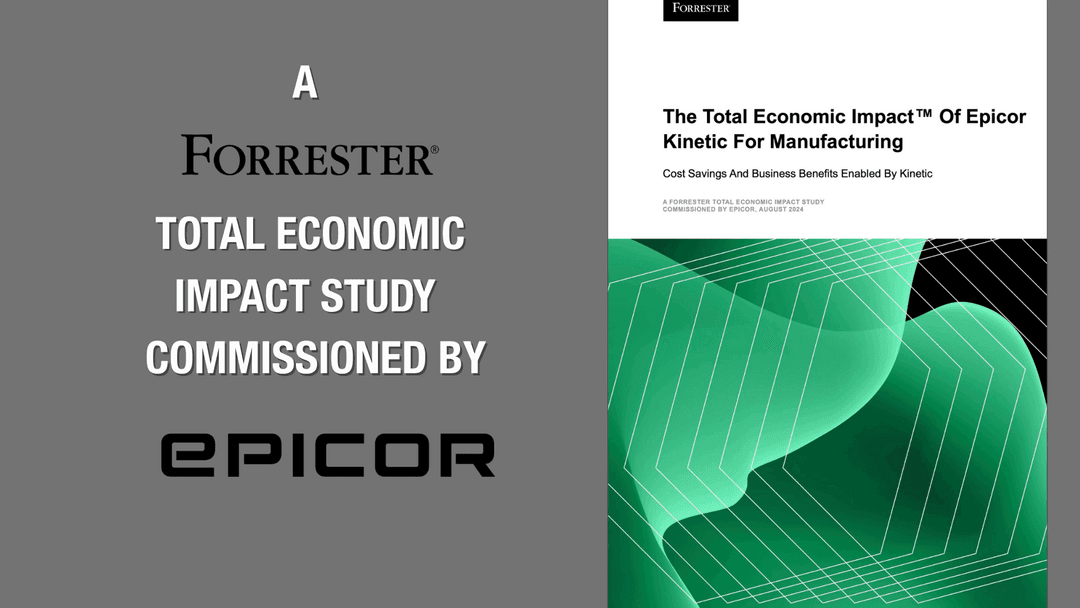The Total Economic Impact™ of Epicor Kinetic for Manufacturing
Ivan Rebolledo
Chief Revenue Officer at TCP

Cost Savings and Business Benefits Enabled by Kinetic
Manufacturing companies need modern enterprise resource planning (ERP) solutions that are tailored to their unique requirements to remain competitive. A modern ERP can connect disparate business areas, offer the depth of functionality required to meet customer demands, and scale for future growth. Legacy ERP systems, which are often siloed and lack modern features, are being replaced by new cloud-based, software-as-a-service (SaaS) solutions. These modern ERP systems, such as Epicor Kinetic, are open, modular, and often include artificial intelligence (AI) capabilities.
Unlike general-purpose ERP tools, which can be challenging for manufacturers with annual revenue under $5 billion to implement, manufacturing-specific ERP solutions are built to address industry-specific needs. They include features like supply chain optimization, configure, price, and quote (CPQ) capabilities, bill of materials (BOM) management, and enhanced financial reporting. AI-powered manufacturing ERP platforms can also help companies accelerate new product development and introduce product variations more quickly.
Market demands and customer expectations for more customized products have also driven the need for manufacturers to modernize their operations. The COVID-19 pandemic further highlighted the need for operational transformation and resilient global supply chains. Factories that deal with a small number of customers and suppliers face unique challenges in managing complex operations while ensuring on-time delivery.
Epicor Kinetic is a cloud ERP solution specifically designed for manufacturers. It uses real-time business intelligence and collaboration tools to streamline complex manufacturing processes. To demonstrate the value of this solution, Epicor commissioned a Total Economic Impact (TEI) study by Forrester Consulting. Forrester interviewed five representatives from four organizations using Kinetic, aggregating their experiences into a single composite organization.
Prior to implementing Kinetic, these organizations reported that their legacy ERP systems lacked the scalability and resilience needed for growth. Their systems were not designed for manufacturing processes, which hindered their ability to collect data, compare performance, control pricing, and scale their operations. After implementing Kinetic, the interviewed companies saw immediate improvements, including increased revenue, improved margins, and higher productivity across their IT and operations teams. The smooth and fast implementation process of Kinetic also resulted in a quicker time-to-revenue compared to their previous systems.
Return on investment (ROI)
270%
_______________________________________
Benefit (PV)
$20.39M
_______________________________________
Net present value (NPV)
$14.87M
_______________________________________
Payback
20 months
“Bringing in Kinetic, our company critically examined our processes: where we were adding value or not, and what we should change. That enabled us to define what it is we do well and make better decisions. It’s a great tool that has enabled us to run our business more efficiently.” CFO, Packaging Products Manufactúrer
This Total Economic Impact™ of Epicor Kinetic for Manufacturing study developed by Forrester would be most valuable to:
- Decision-makers in manufacturing companies: This includes CEOs, CFOs, COOs, and other executive-level personnel who are responsible for making strategic investment decisions. The study's focus on financial metrics like ROI, NPV, and payback period provides a framework for evaluating the potential economic impact of implementing Epicor Kinetic.
- IT and Operations leaders: The study details how a modern ERP system can improve productivity for IT, ERP support, and operations teams. It would be relevant for these leaders who are tasked with evaluating and implementing new technology to drive efficiency and competitiveness.
- Companies currently using outdated legacy ERP systems: The study directly addresses the challenges faced by manufacturers whose homegrown or ineffective legacy systems are hindering growth and scalability. The findings are particularly useful for those who are struggling to gather data, compare performance, and control pricing across multiple sites.
- Manufacturers seeking to improve key business outcomes: The study highlights how a composite organization achieved a faster time to revenue, improved gross margins, and increased productivity after implementing Kinetic. These are key results that any manufacturing leader would want to achieve.
A modern market, driven by competition, emphasizes innovation and technological adoption as key to survival and growth.
This content is provided courtesy of Epicor.
This content is provided courtesy of Epicor
The Total Economic Impact™ of Epicor Kinetic for Manufacturing
Impact™ of Epicor Kinetic for Manufacturing study developed by Forrester would be most valuable to: Decision-makers in manufacturing companies, IT and operations leaders, companies currently using outdated legacy ERP systems, manufacturers seeking to improve key business outcomes. So don’t miss the opportunity to read it, signing up and downloading it from our website.